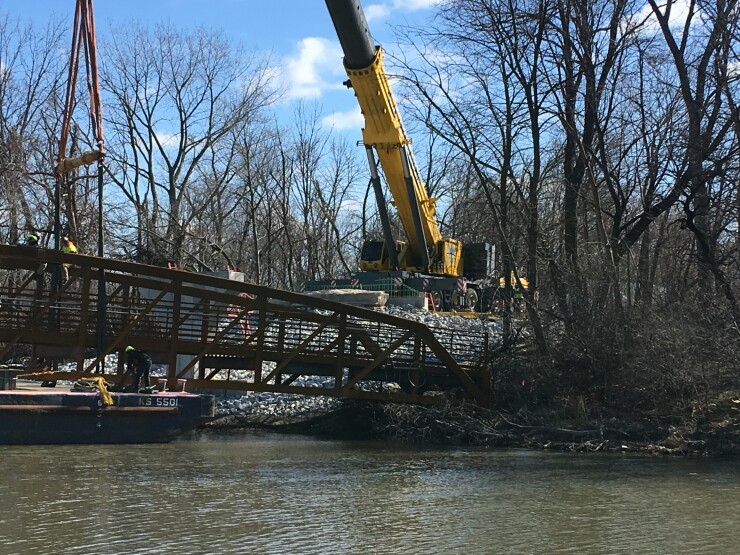CHICAGO – Another suburb is following Chicago’s lead by tapping a state-authorized securitization borrowing program, and it will be the first to leverage state income taxes.
The fiscally stressed home rule community of Riverdale will issue the bonds through the new Riverdale Finance Corp., a special purpose entity that will leverage up to $10 million of the village's share of state income tax revenue. Fifth Third Securities is the underwriter.
With a BB rating from Fitch Ratings, the deal fell two notches short of an investment grade rating but it is better than the village’s issuer default rating of CCC.

“The village intends to use the proceeds to refund $2.1 million of outstanding obligations, establish a working capital fund, and fund certain capital and infrastructure projects located in the village,” Fitch Ratings said.
The bonds will also fund a debt service reserve fund, and capitalized interest through April 1, 2023.
The bonds will hold a first lien on the village's entire local share of the statewide income tax, which is distributed under the Local Government Distributive Fund. The lien will be closed to additional borrowing.
Chicago spearheaded the state legislation last year establishing the new local government borrowing program for home rule units and has authorized up to $3 billion of borrowing to refund existing sales tax revenue and general obligation bonds. Chicago has sold two deals totaling about $1.4 billion and plans to return this fall with a $750 million to $800 million financing.
Bridgeview, another suburb south of Chicago, earlier this year
Riverdale officials did not return calls requesting comment and Fifth Third employees said the structuring details and timing on the estimated $8.4 million of bond sale were still in the works. Fitch said the deal was expected to sell later this month.
According to Fitch, the structure benefits from the statutory protections that the rating agency and bond lawyers believe insulates it from a disruption or impairment should the village file bankruptcy if the state were to add a Chapter 9 statute, but the revenue stream has risks.
Fitch assigned the village a first-time issuer default rating of CCC, five notches lower. “In addition to rating the securitization, we like to assign an issuer default rating so there’s an understanding of the underlying credit quality,” said analyst Matthew Wong.
The rating falls below those Fitch assigned to the Chicago and Bridgeview deals based on the health of the revenue streams. Chicago won a AAA rating from Fitch, a big jump from its BBB-minus general obligation rating. The Bridgeview sales tax securitization achieved a BBB-plus rating, up from a junk-level BB-plus issuer credit rating.
Future prospects for the pledged revenue are weak, having declined by about 0.2% annually on average over the past 10 years, and that trend is expected to continue due to population declines.
The revenue stream is also dependent on the state government, which has altered distribution levels. The state’s fiscal 2018 budget made a 10% cut to the statutory percentage. The newly adopted fiscal 2019 budget makes a 5% cut.
The local share set in statute – but subject to state cuts – is 6.06% of individual income taxes and 6.85% of corporate taxes with local allocations based on the population. The state has seen more than $4.5 billion in additional income tax collections after raising tax rates last year.
Based on fiscal 2017 levels, income tax revenue could tolerate a 48% decline to 1 times coverage, which is 2.5 times the largest historical decline and 7 times the potential impact of a moderate downturn.
The village’s weak speculative grade issuer rating is due to its “severe fiscal distress” because of persistent deficits and a limited tax base. The village’s population has declined by about 1% since 2010 and is now at 13,400 with about 30% under the poverty level. It's about 18 miles south of Chicago.
Debt service and retiree benefits accounted for 29% of expenses last year. The village faces more burdensome payments to its police and firefighters’ funds because contributions fall short of what’s needed to meet a statewide mandate to reach a 90% funded ratio by 2040.
Fitch recently issued a report that revenues sold to a special entity under the state’s new securitization structure are not subject to diversion allowed under state pension statutes. The diversion issues has drawn attention of late after the state comptroller intercepted Riverside neighbor city Harvey’s share of various revenues – like income taxes – to cover overdue public safety pension contributions.
While buried in red ink in recent years, Riverdale is operating with a surplus for the first 10 months of fiscal 2018 after cutting costs and implementing a gas use tax but it will take some years to eliminate an accumulated negative reserve balance, Fitch said.





